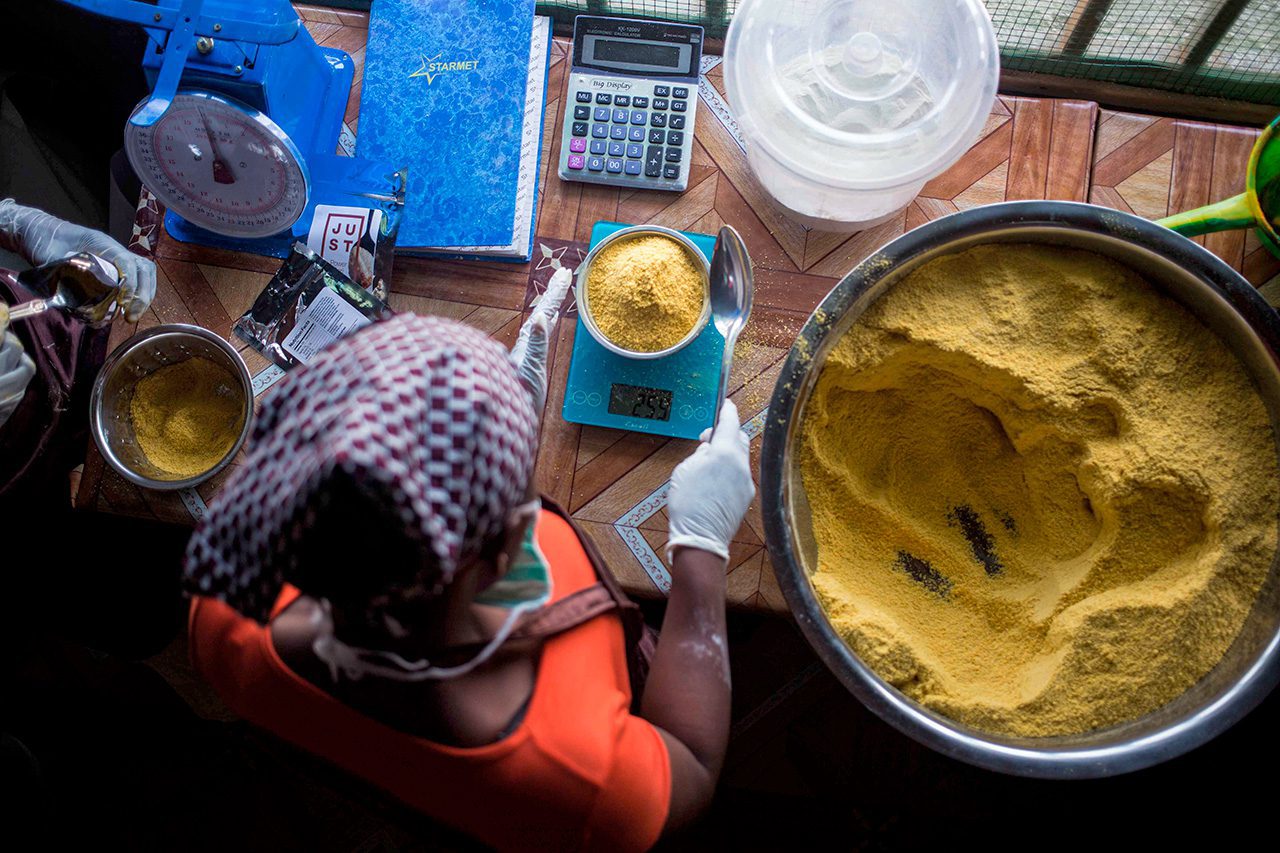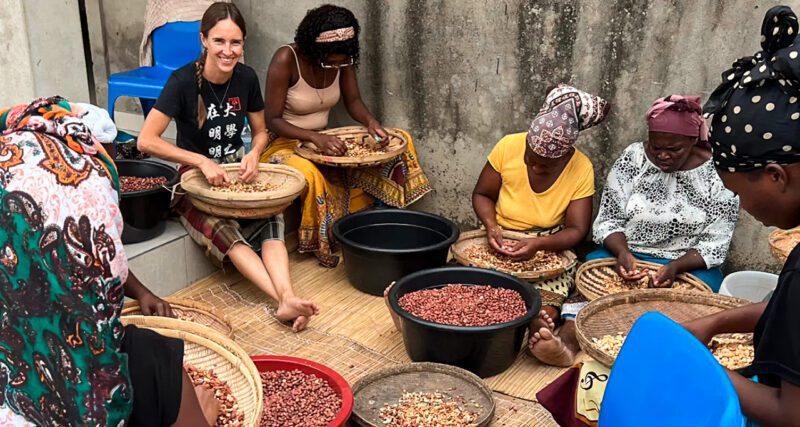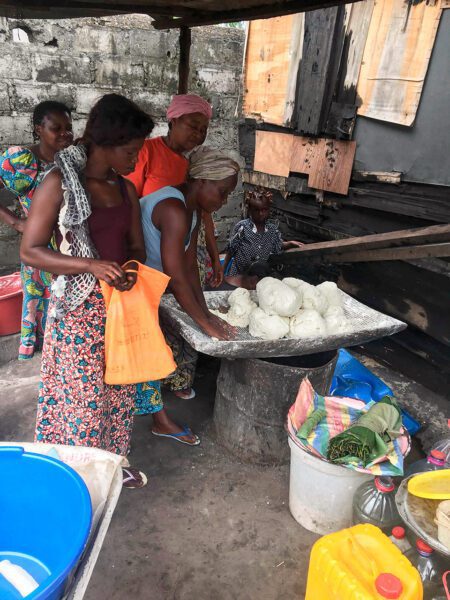Sovereign Seeds: Reclaiming MENA’s Agricultural Future
Reviving local food systems and unlocking rural prosperity

Courtesy of Tailored Food
In March 2016, Taylor Quinn met Dr. Jude, a pediatrician, at a hospital in Monrovia, Liberia. At the time, Liberia was reeling from the Ebola outbreak, and the hospital’s rooms and hallways were filled with starving children. The doctor said that while many of the children would be saved with nutrition supplements, he’d be sending them home knowing their parents had little access to healthy food to sustain them.

Taylor Quinn, Founder and CEO of Tailored Food; Courtesy of Tailored Food
A recent college grad, Taylor was in Liberia working on a project for a California-based company. His conversation with Dr. Jude was the start of his quest to develop and sell nutritious, culturally appropriate food to the world’s poor.
Americans spend on average 11-13% of household income on food. Liberians, many of whom live in extreme poverty, spend more than 60% of their income on food every day. “So, relatively speaking,” Taylor says, “Liberians are spending extreme amounts of their income on food, and yet their kids are dying of malnutrition. I was 22, and didn’t know much about anything, but it didn’t make sense.”
According to Quinn, he became obsessed with the question of whether the problem was solvable. He says, “I’ve come to learn it’s not only possible – but it’s profitable as well – to research, develop, and scale up nutritious, low-cost food products that can be culturally relevant, super delicious, and made by local businesses.”
He established Tailored Food to do that. The first product they worked on was a line of fermented, cassava-based porridges flavored with ingredients like coconut and sesame seed. Production of the porridge mix began with farmers in Liberia, who had been making moonshine out of sugar cane. Taylor says that with $800, they renovated a room in an abandoned building and began production.
The company, Kawadah Farm, has continued to grow, and now produces thousands of kilos of porridge mix which is prepared with milk as a breakfast food, or with vegetables as a savory stew. In Congo, Tailored Food has built a business in which 160 women entrepreneurs make a Congolese-style Clif bar that is packaged in a banana leaf rather than plastic. In Ethiopia, they’ve built a network of female salespeople who sell high protein biscuits door to door.
Liberians are spending extreme amounts of their income on food, and yet their kids are dying of malnutrition.
He feels strongly that no matter the culture, “if you can address the need for food that’s culturally relevant, follows their food tradition, and that’s easy to prepare – people are willing to spend their limited resources on it.” Their experience has demonstrated that, “there’s a clear business model here, and a clear impact opportunity.”
They provide $5,000 grants for start-up capital, and once their partners are producing and selling food locally, Tailored Food shares in the profit. Taylor believes that this produces an alignment in priorities and mission. They are only successful if their grassroots partners are successful, and “if at any point we’re not providing value to them, they can walk away.”

Courtesy of Tailored Food
The products are often sold to food service distributors (servicing school lunch programs, orphanages, and other government programs), as well as through retail stores, roadside stands, or wherever food is bought.
Tailored Food is a Canadian nonprofit, with six full and part-time employees, and in the last seven years, Tailored Food has expanded to work in 18 countries in Africa, and two in Latin America. In addition to working with local farmers and entrepreneurs to launch affordable food products, they consult with global relief organizations such as the World Bank, Save the Children, Mercy Corps, and others, to assess local food system dynamics and to help implement projects. They are currently working with UNICEF in 15 countries. They assist these organizations with food systems change by assessing regional food systems, identifying opportunities for local entrepreneurs, and scaling those projects.

Courtesy of Tailored Food
These consulting projects serve to not only provide funding for Tailored Food grants to grassroots entrepreneurs, perhaps more critically, it helps expand their reach. “We could just be completely focused on working with grassroots entrepreneurs, and expanding systematically that way. But our goal is to share our lessons and learnings as far and wide as possible, and mentor others to get into the space.”
Right now, the primary metrics Tailored Food tracks are the number of meals purchased by low-income families, and the economic value created by their business partners in their communities. “Measuring impact is hard and expensive…and it takes a lot of really serious effort to measure impact in thoughtful ways.” In the future, they hope to be able to do more robust analysis, perhaps by partnering with academic researchers to study the longer-term health impacts of their work.
Taylor Quinn explains, “our biggest hurdle right now is simply our own capacity, and our ability to grow. I wish there were a hundred other organizations doing what we’re doing, honestly. But it’s such a weirdly empty niche, and we can’t grow fast enough to fill the need.”
When asked about the future, he says that in ten years, “I genuinely hope Tailored Food is not a giant organization working in 50+ countries. But I do hope we’ll continue to do really thoughtful, good projects with food system organizations and grassroot entrepreneurs. And I hope that we are a thought leader in the space…working, advising, mentoring, and volunteering with other organizations using the methodologies and lessons we’ve learned in creating nutritious, low-cost food systems.”
Related Content
Comments
Deep Dives

Featuring
Clarisse Awamengwi
IE Correspondent
July 17 - 12:00 PM EST

Featuring
Russell McLeod
July 24 - 12:00 PM EST
RECENT
Editor's Picks
Webinars
News & Events
Subscribe to our newsletter to receive updates about new Magazine content and upcoming webinars, deep dives, and events.
Become a Premium Member to access the full library of webinars and deep dives, exclusive membership portal, member directory, message board, and curated live chats.
At Impact Entrepreneur, we champion fearless, independent journalism and education, spotlighting the inspiring changemakers building the Impact Economy. Diversity, equity, sustainability, and democracy face unprecedented threats from misinformation, powerful interests, and systemic inequities.
We believe a sustainable and equitable future is possible—but we can't achieve it without your help. Our independent voice depends entirely on support from changemakers like you.
Please step up today. Your donation—no matter the size—ensures we continue delivering impactful journalism and education that push boundaries and hold power accountable.
Join us in protecting what truly matters. It only takes a minute to make a real difference.
0 Comments